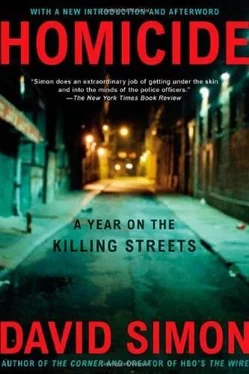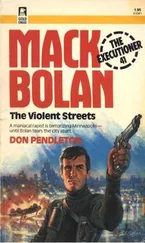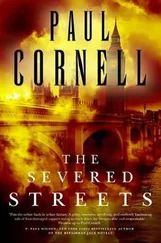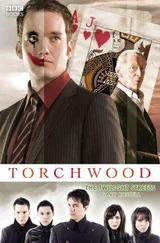“They ruined us,” Garvey told me before putting in his papers. “This was a great unit and it was like they had a plan to ruin it.”
For my part, I had come to feel much the same in my own world, having seen some of the best reporters at my newspaper depart for the New York Times, the Washington Post and other papers-chased by an institutional arrogance that was every bit equal to that of the police department.
Struck, Wooten, Alvarez, Zorzi, Littwin, Thompson, Lippman, Hyman-some of the best reporters the Baltimore Sun had were marginalized, then bought out, shipped out and replaced with twenty-four-year-old acolytes, who, if they did nothing else, would never make the mistake of having an honest argument with newsroom management. In a time of growth, when the chance to truly enhance the institution was at hand, the new regime at the Sun hired about as much talent as they dispatched. And in the end, when the carpetbaggers finally departed, their mythology of heroic renewal intact, they had managed to achieve three Pulitzers in about a dozen years. During the previous dozen, the newspaper’s morning and evening editions achieved exactly the same number.
Listening to Garvey over drinks that day, I came to realize that there was something emblematic here: that in postmodern America, whatever institution you serve or are served by-a police department or a newspaper, a political party or a church, Enron or Worldcom-you will eventually be betrayed.
It seemed very Greek the more I thought about it. The stuff of Aeschylus and Sophocles, except the gods were not Olympian but corporate and institutional. In every sense, ours seems a world in which individual human beings-be they trained detectives or knowledgeable reporters, hardened corner boys or third-generation longshoremen or smuggled eastern European sex workers-are destined to matter less and less.
After watching what was done to my newspaper, and to the Baltimore homicide unit, I began to write the pilot for a new HBO drama. The Wire, for better or for worse, has occupied my time since.
Just after reading the manuscript for Homicide, Terry McLarney mailed me a single sheet of white bond paper. Atop that solitary page:
“The Book. Volume II.”
And then the sentence, “My God. They’ve all been transferred. I think I see now what it is they were trying to tell me.”
That was the only shot fired across my bow before publication, the only warning-however lighthearted-that the book might prove problematic for those it characterized.
And in the wake of Frazier’s rotation policy, as well as other departures of veteran detectives unrelated to that policy, McLarney’s dry, comic lament might certainly seem prophetic.
But there is a corresponding truth, and one that also bears noting: In 1998, looking back a decade to the year when I followed these men with pen and notepad akimbo, it was accurate to say that more than three-quarters of them were no longer in the Baltimore city homicide unit. But, looking back ten years from my moment as a police intern, it is also true that three-quarters of the detectives who had manned the unit in 1978 were also gone. And they departed, of course, without any book having been written about them.
Time itself is a means of attrition.
And, in time, Baltimore became comfortable with its depiction in both Homicide: A Year on the Killing Streets and the television drama that followed. The mayor appeared on the show; Maryland’s governor as well. The actors themselves came to be regarded as resident Baltimoreans, or Baltimorons as some of us like to call ourselves. Over the last decade and a half, I’ve signed copies of the book for the city’s politicians, for its civic leaders, for its lawyers, its cops, its criminals.
In some quarters, though, my welcome has worn thin, perhaps because both The Corner and The Wire offer a much darker vision of the problems that confront the city. There is consternation about the net effect of all this murderous narrative on Baltimore’s image and its viability as a tourist destination, to be sure. Conversely, there is also a peculiar pride at being part of a city that endures despite such an appalling and persistent rate of violence.
I know that sounds ridiculous-a hoary citing of lemons and lemonade-but there is something to it. From the first, Homicide was, I think, a blunt and clear-eyed response to the national neglect of urban problems, demonstrating if not our civic ability to solve those problems, then at least our honesty and wit in confronting them.
The Natty Boh beer ads used to declare Maryland to be “The Land of Pleasant Living,” just as a standard credo of local pride claims of Baltimore that “If you can’t live here, you can’t live anywhere.”
Such sentiments might seem grandly mocked by the contents of Homicide or The Corner or certainly, given its angry, political tone, The Wire. But no such sarcasm is intended, and among residents of this city I don’t sense that many feel particularly abused. If you live here, you know the good, and you still sense the civic ideal that has somehow managed to survive so much poverty, violence and waste, so much mismanagement and indifference.
Recently, the city paid a half million dollars to a consultant seeking a new slogan for itself:
“Baltimore-Get In On It”
I like it. An implied secret. As if you need to walk these streets for a while before you’re entitled to know for certain what is at stake in this city’s survival and why so many people still care.
But I confess that my favorite slogan came from a short contest sponsored on the daily newspaper’s website, where readers offered their own free suggestions to the highly paid image consultants, and one local resident, tongue in cheek, wrote:
“It’s Baltimore, hon… duck!”
The detectives would have recognized the humor, and, more than that, the temperment that gives rise to such humor. Hell, if they could buy the bumper sticker, they’d probably have it on the back of every unmarked unit.
These men lived and worked without illusion, and late at night, when I was rewriting sections of the book for the third and fourth time, I realized that I was trying to achieve a voice, a statement even, that they would recognize as true.
Never mind the demographics of bookbuyers, or the sensibilities of other journalists, or, God forbid, whoever might be judging some book award somewhere. Fifteen years ago, when I was trapped at my computer, the only judgments that mattered to me were those of the detectives. If they read the book and pronounced it honest, I would not feel the shame that comes from snatching pieces of human lives and putting them on display for all to see.
This is not to say that everything I wrote was complimentary or ennobling. There are pages of the book on which these men appear to be racist or racially insensitive, sexist or homophobic, where their humor derives from the poverty and tragedy of others. And yet with a body on the ground-black, brown, or, on rare occasion, white-they did their job regardless. In this graceless age of ours, any sense of duty is remarkable enough to excuse any number of lesser sins. And so readers learned to forgive, just as the writer learned to forgive, and six hundred pages later the very candor of the detectives was a quality, rather than an embarrassment.
In the preface to Let Us Now Praise Famous Men, James Agee asked absolution for his journalistic trespass, declaring that “these I will write of are human beings, living in this world, innocent of such twistings as these which are taking place over their heads; and that they were dwelt among, investigated, spied on, revered and loved by other quite monstrous human beings, in the employment of others still more alien; and that they are now being looked into by still others, who have picked up their living as casually as if it were a book.”
Читать дальше












